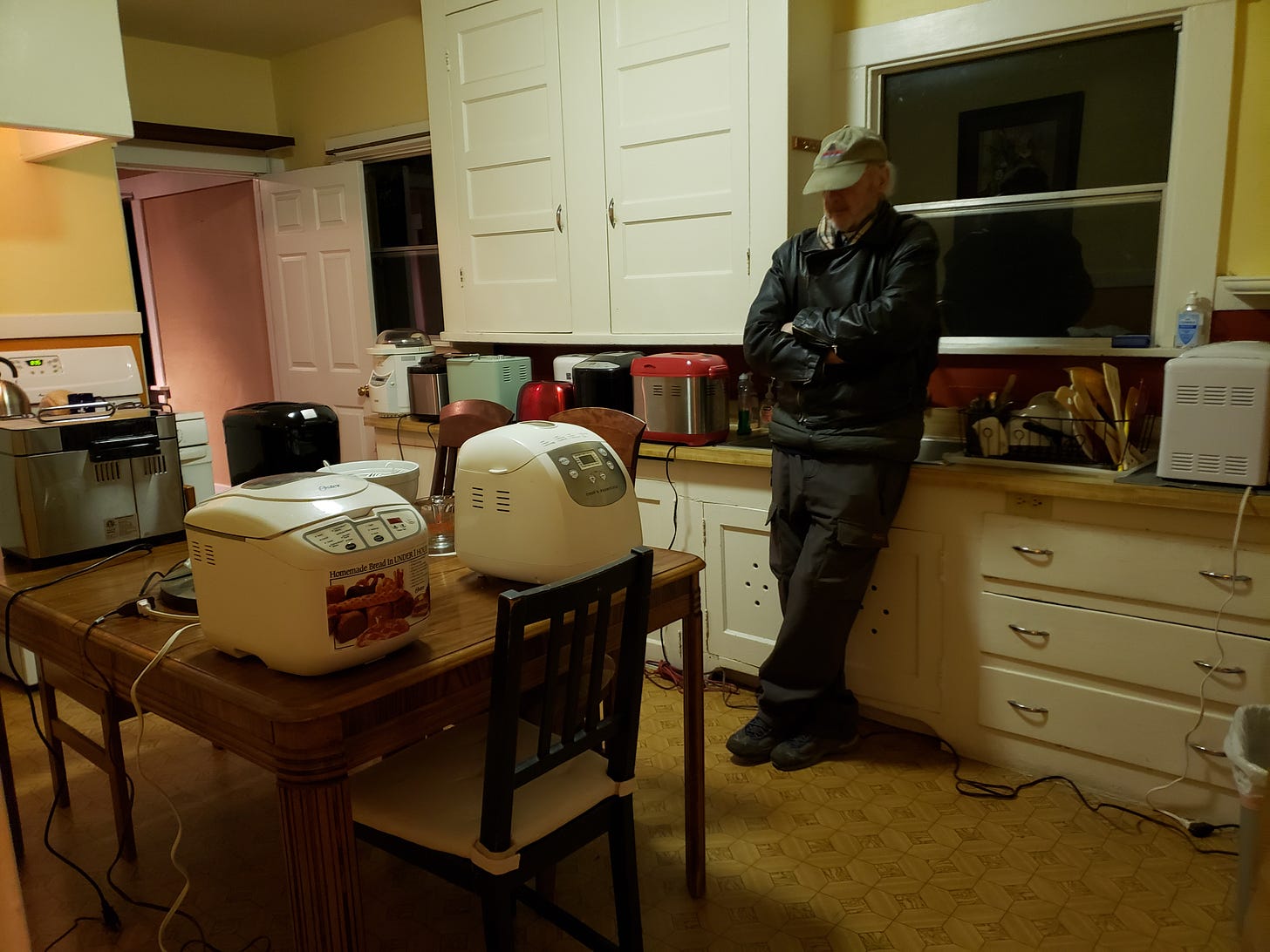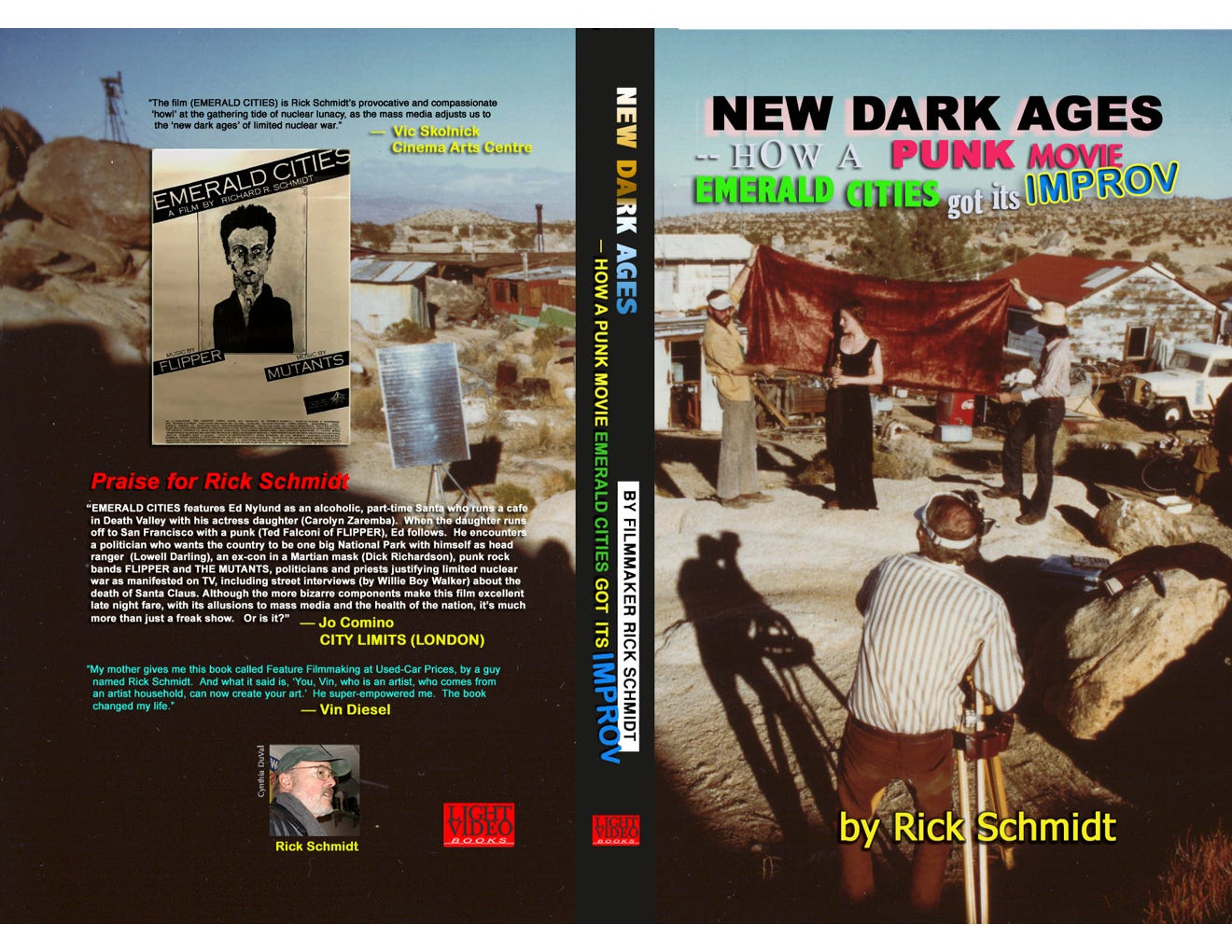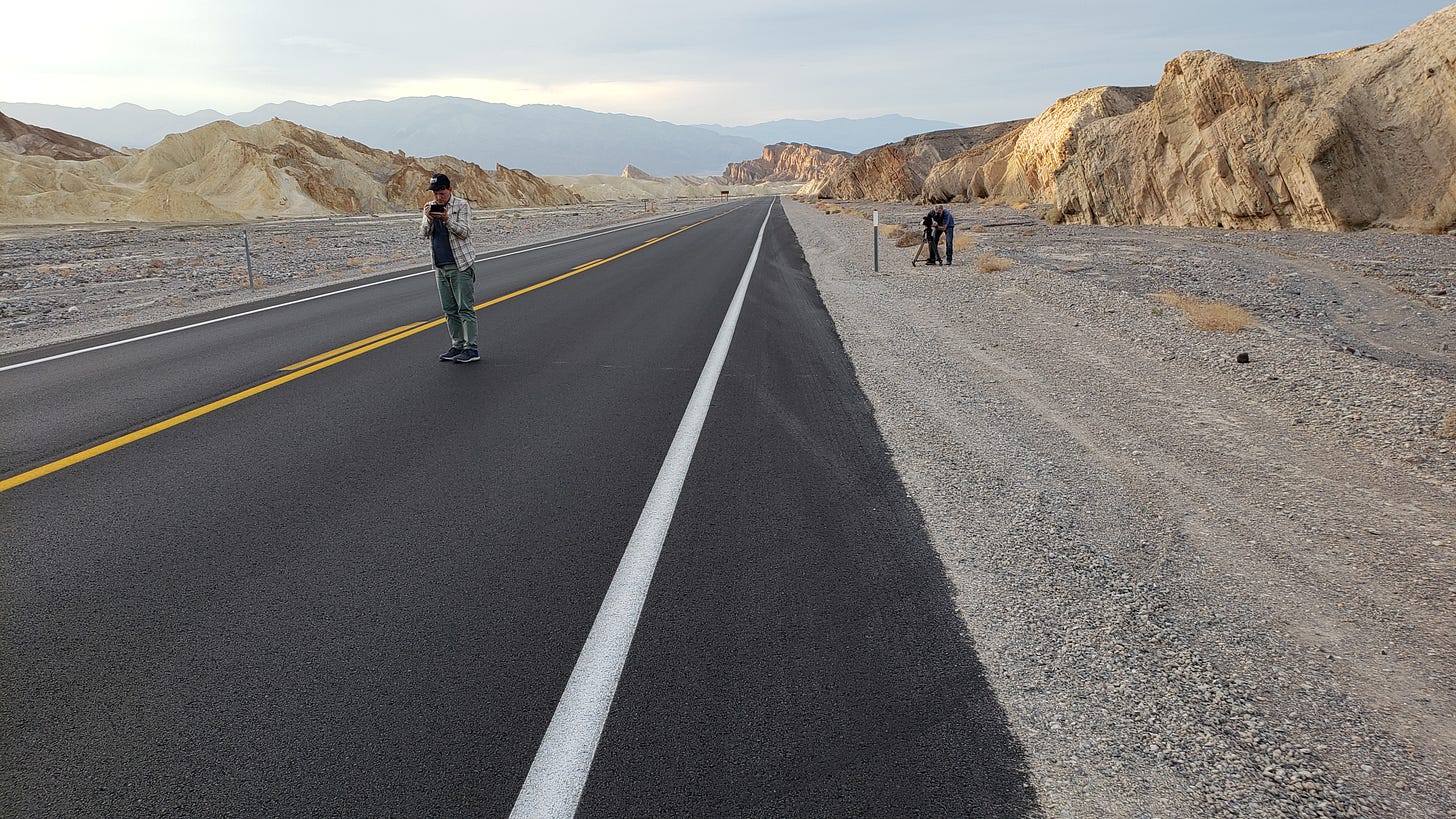"FEATURE FILMMAKING AT USED-CAR PRICES...(MORE INFO-a surprise 'English lesson' I desperately needed to write my 1988 Viking Penguin book!)
My first "Used-Car" film book--cheap copies here:): https://www.abebooks.com/servlet/SearchResults?cm_sp=SearchF-_-topnav-_-Results&ds=20&kn=feature%20filmmaking%20at%20used%20car%20prices%20rick%20
1995 edition of FEATURE FILMMAKING AT USED-CAR PRICES.
BELOW is Excerpt from my book, NEW DARK AGES--How a Punk Movie EMERALD CITIES Got Its IMPROV.
CONTINUING WITH “MY BOOK DEAL” CHAPTER––MORE DETAILS ABOUT an ENGLISH LESSON FROM AGENT JAYNE WALKER, SKILLS ENOUGH TO COMPLETE A PUBLISHED BOOK––(making up many years of failed classes, finally FOCUSING ENOUGH to learn!)
*********
Happily, I was still on track for whatever plan/schedule she had in mind. I now received my next assignment by phone from litertary agent Jayne Walker.
“What I need now is a Table of Contents and the first three how-to chapters. With that, I can sell the book,” said Jayne, matter-of-factly. “Let me know when that’s completed.”
I thanked her and hung up. Three chapters. OK. And again I started in.
I decided to use my three-part summer Feature Workshop structure as a beginning point. I had divided that production into three month-long sessions; Scripting/Pre-Production, Shoot/Directing, and finally Editing/Printing of a 16MM film. All the steps of producing a feature film were contained within those three parts, so I used that template, reworking the terms just a bit. The first section would just be called, “Story Concept For a Feature Film.”
Taking a breather–-BREAD MACHINE shoot, March, El Cerrito, CA (photo by Julie Schachter ©2024.
After writing for about a month-and-a-half I finally had the rough draft of three chapters (Story Concept For a Feature Film, Scriptwriting For a No-Budget Feature, and Beginning), and had mailed them off to Ms. Walker. In a few days I heard back. She called to say, It’s time for us to meet. She gave a date, time and her address in the Berkeley hills, and I arrived on the designated day.
Jayne lived up Euclid Ave. which was one of the steep streets that led to the Berkeley Hills from the UC Berkeley campus. It was a nice wooded area with a nearby park, that offered amazing views of the entire Bay Area, San Francisco and the Golden Gate Bridge beyond. Her apartment seemed quite modest as I was welcomed in.
After our short introductions, she walked me over to a table upon which sat the three single-spaced Velo bound chapters I had sent. I sensed from her body language she was contemplating exactly which words to choose to begin our discussion. Finally she spoke.
“First of all, thanks for all the work you’ve done. This is a good start...”
“Oh...Good,” I automatically responded. But the tone of her voice didn’t really give me a reason to jump for joy. As she continued I understood why.
“But there is considerably more that needs to be accomplished.”
“Oh.” And I repeated, “OK.” I was alert, ready to deliver any work I could, to get the job done to her satisfaction.
“To begin with,” said Jayne, “the emphasis needs to be changed. It must be more about the reader’s needs to make a movie. It needs to support their dream, not yours.”
“I see.” As I very carefully listened to Jayne, I began to mentally revise the many pages I had delivered. And strangely enough, I hadn’t lost any energy from her criticism of my initial attempt. I was just happy she was sticking with me.
“So you need to rewrite these chapters, giving the prospective readers what they need. And I believe you can.”
I may have nodded, but remained silent, sensing she still had more to say.
“But before I let you go, I’d like to go over some basic rules of English, to make the writing more stable and accomplished. I teach English at Cal and, if you don’t mind, I’m going to give you a condensed version of my class.”
“That’s fine.” I let her know that I was game. And she dove right in.
“Starting at the beginning,” she began, “...you should understand that the first sentence of a paragraph should have something to do with the rest of that paragraph.”
With her comment, I remember realizing that my poor student days were showing. But again, I didn’t feel threatened or reduced in my commitment to improving the project. I somehow maintained my equilibrium, was almost thrilled in fact, to follow her rules of English carefully as she dug into the depths of correct usage. I kept notes as she talked.
Hours went by. I found myself (a) trying to absorb everything she said, and also (b) somewhat enthralled as she demystified my native language, correcting usages and word-patterns, past, present, future tenses of verbs, sentence structure, descriptive phrases, all the stuff that must be correct and crisp in order to make one’s written communication shine and be publishable.
The one-on-one class she conducted took about four hours total.
As it ended, she took a big breath and announced that she had just delivered her entire college-level English class in one afternoon. I realized that I had just received an amazing gift. After thanking her profusely and agreeing on an approximate deadline for the redo I left, drove my car out from its steep parking slot, and rolled dreamily down toward the Berkeley flatlands and my Point Richmond home.
That meeting in 1986-7 (38 years ago!)––Jayne’s determination to get a publishable trade paperback out of me––had put me back on track. I was excited to put her instructions to good use before I forgot anything. Having such a devoted professional in my life made all the difference. So I went back to square one and restarted my routine––banging away on my electric typewriter between 6AM-8AM each morning, and using high-quality, one-time black ink tape cartridges on my Smith Corona so that the well-defined letters gave the appearance of a finished work. And I bought bottles of White-Out in3-packs, to avoid retyping chores. I can’t remember exactly how long those rewritten chapters took to complete, but probably another hard-working two months passed by. This time I delivered the pages in double-space like I’d seen in her examples. And I just bundled up pages as decreed, no Velo binding, and mailed them off again.
Almost instantly as I departed the post office the thought hit, How many times am I capable of rewriting these pages? Not an easy reckoning, as I awaited her verdict. If she again found major fault in either the content or the language I used, would I be able to spend another couple months of my life repeating work on this spec book? I hoped so.
This writing business was the only positive thing going on in my filmmaking career. And, of course, my wife and close friends still knew nothing about any of this. I continued to keep it bottled up, in order to preserve every bit of energy. So, how long would I deliver rewrites? I answered my own question with, “Forever––if that’s what it took to succeed in getting published and paid.”
In my ‘Used-Car filmmaking’ books I described the process of writing as if I were a condemned man, penning his memoirs while awaiting the guillotine. Yes, I know that was a bit overdramatic, but fortunately, desperation did propel me forward as I jumped through the hoops that my literary agent now set up for me.
Finally Jayne called. And she didn’t mince words. Luckily, they were in my favor.
“Good job.”
Oh, man, I’m suddenly floating...
“You’ve brought the manuscript to 90%, which is what was needed. And an editor will bring it the rest of the way. I’m heading for New York next week and will try to interest some publishers. I’ll call you after I return. Bye.”
I was in shock, amazed that I had actually written an acceptable manuscript. Me!
A memory from high school suddenly surfaced. My elderly English teacher there suddenly started asking me to read aloud in class. I was terrible at it, and terrified––for dyslexic people like me it’s truly problematic. But she kept calling on me. Why, I don’t know.
At any rate, remembering my success with the rewrite now, I can only say it reinforces the Summerhill educational approach to learning, which I discovered years back from reading a book by that same title. At that unusual, open-curriculum school in England, they didn’t demand that their students take any classes that weren’t of personal interest to them. Then, later, when a student suddenly approached a teacher asking for assistance, all professional support was thrown his/her way. After that, maybe all a student did was study anatomy. Math. Botany. Or art. And these now self-motivated kids were able to accomplish in a half- year what it normally took two years of attending classes to finish. It was all about focus...and love of learning. And that’s probably what had just happened to me. I had experienced my academic years, from early grade school on through college as an under-achiever, but here I was succeeding because the result meant something to me, and I loved the work.
(DEATH VALLEY––Morgan Schmidt-Feng (rear) shooting for DOC on “USED-CAR” MOVIEMAKING (PASSWORD- rickdoc)
(With writer/dirctor Chris Brown (middle of road) on 2nd doc camera).
————-







A great story, Rick, of determination and desperation, which always seem to meet at the right moment in the intersection when the light goes from red to green, keeping the mystery of art just beyond expectation. Nice job.
"I realized that I had just received an amazing gift." What a great point in your lifework to learn so dramatically about the gifts that await the one who follows their heart.